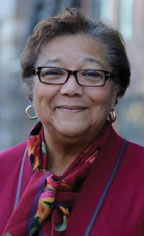 Report: Black women under represented in public office
Report: Black women under represented in public office
D.C. Council member Anita Bonds thinks that more Black women should seek political office. (Twitter Photo)
By James Wright
Despite the high-profile of Black women office holders like D.C. Mayor Muriel Bowser (D), Baltimore Mayor Stephanie Rawlings-Blake (D) and U.S. Rep. Donna Edwards (D-Md.), Black women hold few elected positions, particularly in state-wide offices, according to a December report.
It was commissioned by Higher Heights, a non-partisan organization dedicated to getting Black women elected to public office. The report, authored by Kelly Ditmar and produced in conjunction with the Rutgers University’s Center for American Women and Politics, said that Black women make up 7.4 percent of the nation’s population but only 3.4 percent of the U.S. Congress, 3.5 percent of state legislators, 1.9 percent of mayors in cities with more than 30,000 people and less than one percent of state-wide elected officials.
Ditmar said that low numbers are discouraging given Black women’s level of voter participation.
“Black women have registered and voted at higher rates than their male counterparts in every election since 1998,” Ditmar said. “Moreover, they surpassed all other race and gender subgroups in voter turn-out in 2008 and 2012. Black women also turned out to vote at a rate of seven percentage points higher than their Black male counterparts in the 2014 midterm elections, out-numbered Black men at the polls by over two million votes and are at the highest rate among any non-White group.”
There are only three Black female statewide elected officials in the country: California Attorney General Kamala Harris (D), Connecticut State Treasurer Denise Nappier (D) and Kentucky Lt. Gov. Jenean Hampton (R). Ditmar said that there are some “distinct hurdles” to Black women seeking political office.
“Black women are less likely to be encouraged to run for office and are more likely to be discouraged from running than Black men and white women,” Ditmar said. “Black women also navigate race and gender stereotypes and the intersections therein, while running for and serving in office. Finally, Black women represent less affluent districts and are less likely to be part of moneyed net-works, posing hurdles to fundraising.”
D.C. Council member Anita Bonds (DAt Large), chairman of the D.C. Democratic State Committee, agrees with Ditmar’s conclusions. “Black wo-men are often charged with taking care of their families so they don’t get involved as much as they want to,” Bonds said, who has served for decades in management levels in political campaigns, D.C. Council members offices and the District government. “They tend to look to the males for political direction.”
Nevertheless, Ditmar said that some Black women have succeeded despite the challenges.
“Black women have proven their capacity to overcome these hurdles and, even more, capitalize upon the distinct advantages that they bring to candidacy and office holding,” she said. “Black women’s confidence and political experiences in com-munity work and activism have contributed to their political ambition and success.”
There are 18 Black women in the U.S. House of Representatives that includes delegates from the District and the U.S. Virgin Islands and all of them but Rep. Mia Love (R-Utah) are Democrats. There are no Black women in the Senate. The first and so far only, Black woman to be elected to the Senate was Illinois’s Carol Moseley Braun, who served from 1993-1999.
D.C. Council member Anita Bonds (D-At Large) said that it will take some generational mending for Black women to become the political force that it has the potential to be. “This younger generation of Black women doesn’t think you can make a difference in the lives of people by being a politician. For example, I have four granddaughters and they are more interested in business and entrepreneurship and see that route as serving their community rather than going into politics,” she said.
